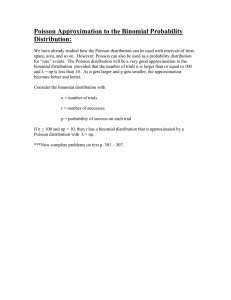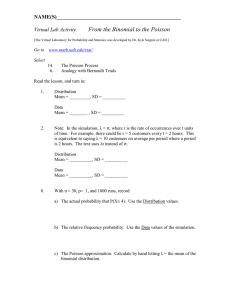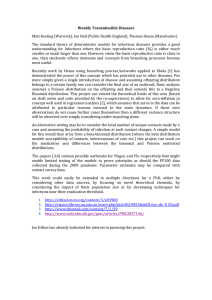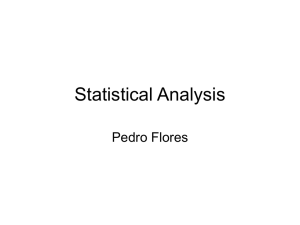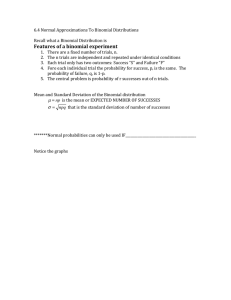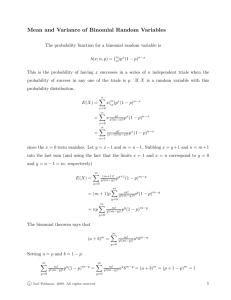Continuous Probability Distributions: Binomial & Poisson
advertisement
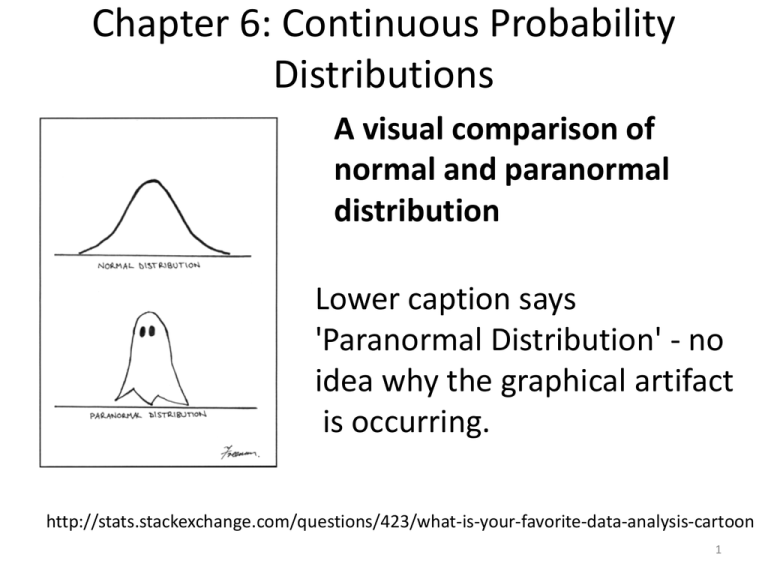
Chapter 6: Continuous Probability Distributions A visual comparison of normal and paranormal distribution Lower caption says 'Paranormal Distribution' - no idea why the graphical artifact is occurring. http://stats.stackexchange.com/questions/423/what-is-your-favorite-data-analysis-cartoon 1 5.4/5.5: Binomial and Poisson Distributions - Goals • Determine when the random variable X can be modeled using the binomial or Poisson Distributions. • Calculate the probability, mean and standard deviation when X has a binomial or Poisson distribution. 2 Properties of a Binomial Experiment BInS • Binary: There are only two possible outcomes for each trial. • Independent: The outcomes of the trials are independent. • n: The experiment consists of n identical trials where n is fixed.. • Success: For each trial, the probability p of success must be the same. 3 Binomial Distribution The binomial random variable maps each outcome in a binomial experiment to a real number, and is defined to be the number of successes in n trials. • X ~ B(n,p) 4 Binomial Probabilities Suppose X is a binomial random variable with n trials and probability of a success p. Then 𝑛 𝑥 𝑃 𝑋=𝑥 = 𝑝 (1 − 𝑝)𝑛−𝑥 , 𝑥 = 0,1,2, … , 𝑛 𝑥 𝑛 𝑛! = 𝑥 𝑥! 𝑛 − 𝑥 ! 5 Histograms of Binomial Distributions 0.2 0.15 0.1 0.2 0.15 0.1 0.05 0.05 0 0 0 1 2 3 4 5 6 7 8 9 10 Number of successes 0.3 0 1 2 3 4 5 6 7 8 9 10 Number of successes n = 10 p = 0.75 0.25 P(X=x) 0.25 P(X=x) n = 10 p = 0.25 0.25 P(X=x) n = 10 p = 0.5 0.3 0.3 0.2 0.15 0.1 0.05 0 0 1 2 3 4 5 6 7 Number of successes 8 9 10 6 Binomial Distribution: Mean and Standard Deviation If X ~ B(n,p) then E(X) = X = np 𝜎𝑋 = 𝑛𝑝(1 − 𝑝) 7 Poisson Random Variable • The Poisson random variable is a count of the number of times the specific event occurs during a given interval. • Example: – The number of people who enter the Union from noon to 1 pm. – The number of α-particles emitted from Uranium-238 in 1 minute. – The number of DNA fragments found from a sequencing experiment. – The number of dead trees in a square mile of forest. 8 Poisson Experiment 1. The probability that a particular event will occur in a given interval (of time, length, volume, etc.) is the same for all units of equal size and is proportional to the size of the unit. 2. The number of events that occur in any interval is independent of the number that occur in any other non-overlapping interval. 3. The probability that more than one event occurs in a unit of measure is negligible for very smallsized units. 9 Poisson Distribution X ~ Poisson() 𝑒 −𝜆 𝜆𝑥 𝑝 𝑥 =𝑃 𝑋=𝑥 = , 𝑥 = 0, 1, 2, … 𝑥! 𝜆>0 X = 2 = 𝜎𝑋 = 𝜆 10 6.1: Probability Distributions for a Continuous Random Variable - Goals • Describe the basis of the probability density function (pdf). • Use the probability density function (pdf) and cumulative distribution function (cdf) of a continuous random variable to calculate probabilities and percentiles (median) of events. • Be able to use a pdf to find the mean of a continuous random variable. • Be able to use a pdf to find the variance of a continuous random variable. 11 Density Curve (a) (b) (c) 12 Probability Distribution for Continuous Random Variable • A probability distribution for a continuous random variable X is given by a smooth curve called a density curve, or probability density function (pdf). y = f(x) f(x)dx 1 Area = 1 13 Probabilities Continuous Random Variable • The curve is defined so that the probability that X takes on a value between a and b (a < b) is the area under the curve between a and b. b P(a X b)= f(x)dx a 14 Properties of pdf • f(x) ≥ 0 • ∞ 𝑓 −∞ 𝑥 𝑑𝑥 = 1 15 Formulas for the Mean of a Random Variable • Discrete – Mean Discrete – Rule 3 𝐸 𝑋 = 𝜇𝑋 = 𝐸 𝑔 𝑋 𝑥𝑝(𝑥) • Continuous 𝐸 𝑋 = 𝜇𝑋 = ∞ 𝑥𝑓 −∞ = 𝑔 𝑥 𝑝(𝑥) Continuous – Rule 3 𝑥 𝑑𝑥 𝐸(𝑔(𝑋)) = ∞ 𝑔(𝑥)𝑓(𝑥)𝑑𝑥 −∞ 16 Variance of a Random Variable Var(X) = E X − 𝜇𝑋 ∞ = 2 = (𝑥 − X )2 ∙ 𝑝(𝑥) (𝑥 − X )2 𝑓(𝑥)𝑑𝑥 −∞ = E(X2) – (E(X))2 𝜎𝑋 = 𝑉𝑎𝑟(𝑋) 17 Cumulative Distribution Function (cdf) • F(x) = P(X ≤ x) = 𝑥 𝑓 −∞ 𝑠 𝑑𝑠 18 pdf – Percentiles • Percentiles – Let p be a number between 0 and 1. The 100pth percentile is defined by 𝑥 𝑝= 𝑓 𝑠 𝑑𝑠 = 𝐹(𝑥) −∞ • The median of a pdf is the equal – areas point. 𝜇 𝑝 = 0.5 = 𝑓 𝑥 𝑑𝑥 = 𝐹(𝜇) −∞ 19
